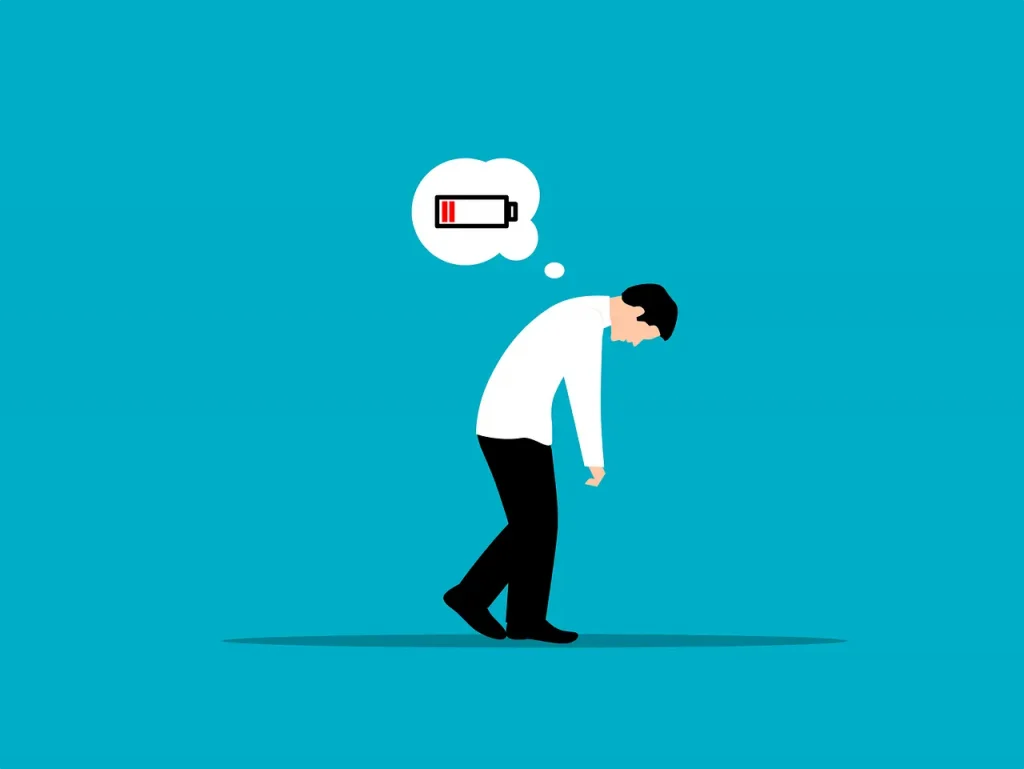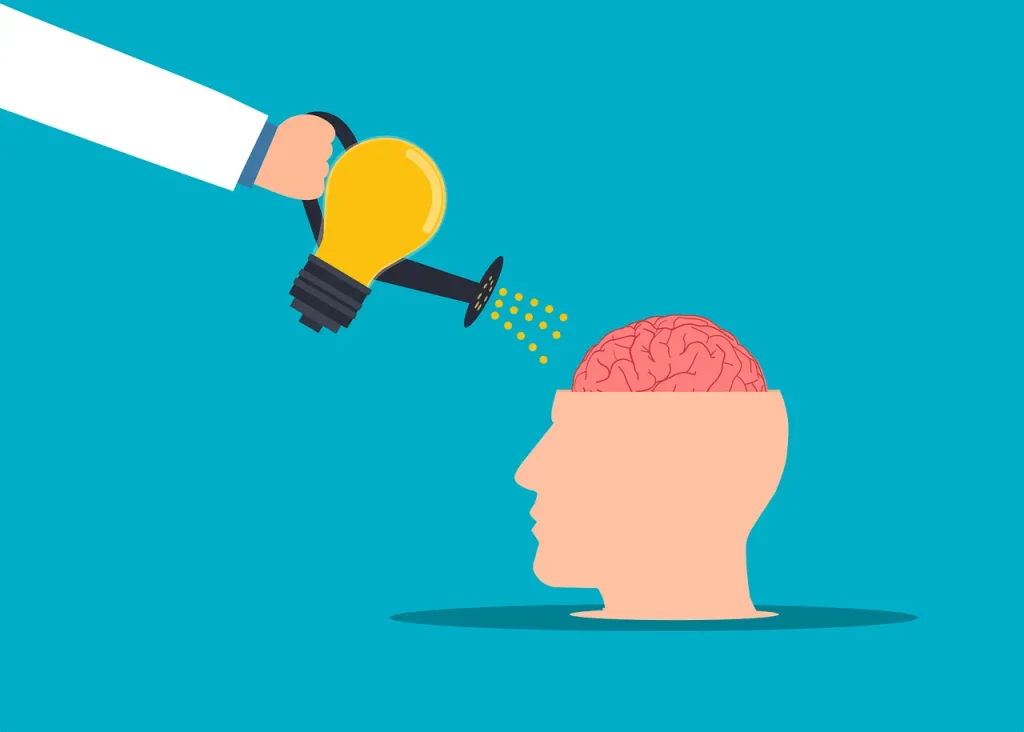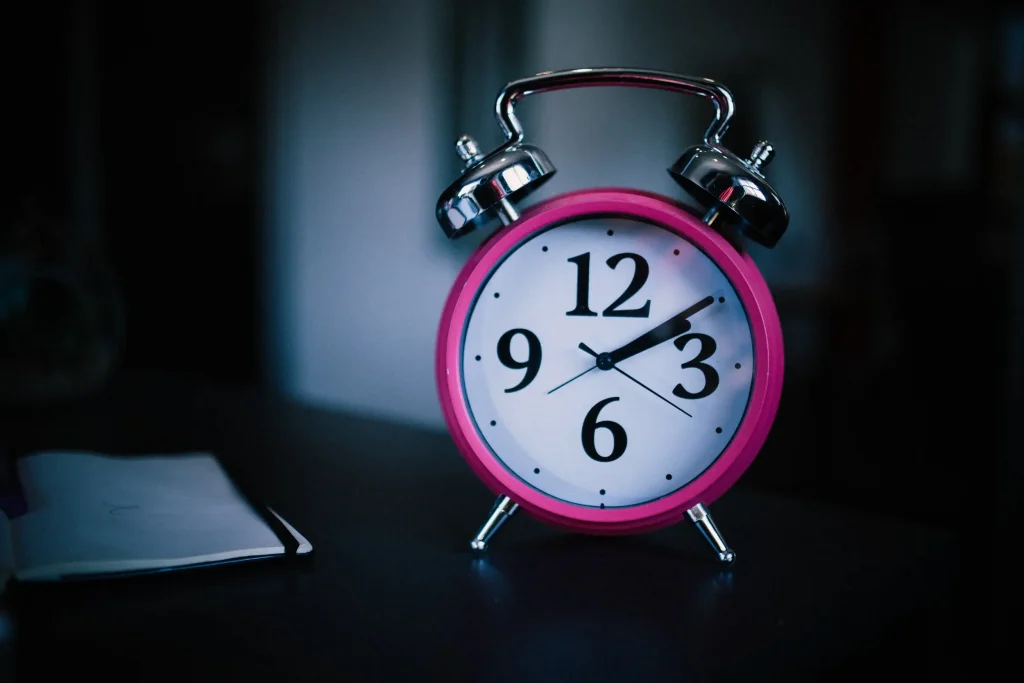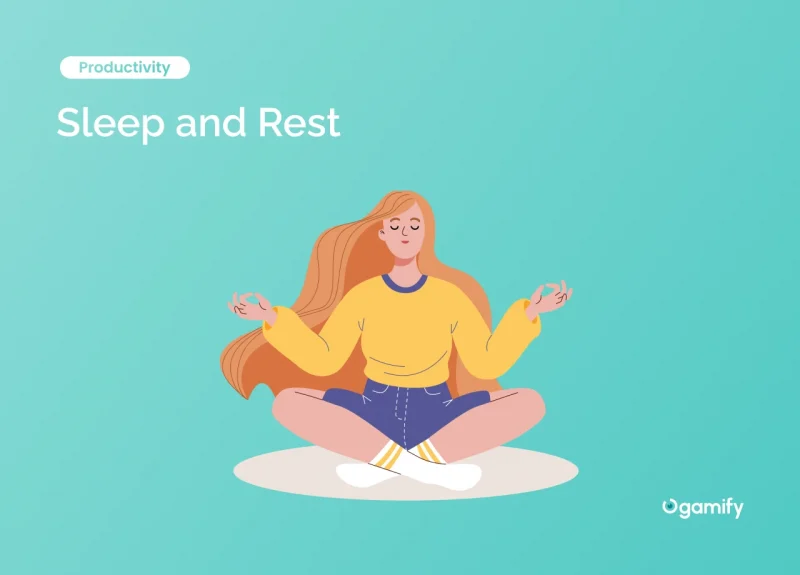In today’s fast-paced world, people often prioritize their work over their rest and sleep, negatively impacting their productivity. The importance of workplace productivity and sleep deprivation is often overlooked, but the truth is that they go hand in hand.
In this article, we will explore the significance of sleep and rest in relation to productivity and how it affects work performance. We will also discuss sleep hygiene and the minimum amount of sleep needed for optimal brain function. Additionally, we will delve into what are the effects of sleep deprivation at work, poor sleep hygiene, sleep disorders and productivity at work. So, how does sleep improve productivity? Let’s find out.
What is sleep hygiene?

Sleep hygiene refers to a set of healthy practices that help individuals improve the quality of their sleep. It encompasses various lifestyle habits and environmental factors contributing to a restful and rejuvenating sleep experience. Sleep hygiene is crucial for maintaining good physical and mental health as it increase motivation which affects our overall well-being.
Factors of sleep hygiene
One of the important aspects of good sleep hygiene is creating a conducive sleep environment. This includes keeping the bedroom cool, dark, and quiet, investing in a comfortable mattress and pillows, and removing any distractions that may disrupt sleep. This helps to create a relaxing atmosphere and prepares the mind and body for sleep.
Another important aspect of sleep hygiene is establishing a consistent sleep schedule. This involves going to bed and waking up simultaneously every day, even on weekends. This helps regulate the circadian rhythm, the body’s internal clock that controls sleep-wake cycles. A consistent sleep schedule also improves sleep quality and reduces the risk of sleep disarray.
Limiting caffeine intake is another important aspect of sleep hygiene. Caffeine is a stimulant that can interfere with sleep and increase the time it takes to fall asleep. Avoiding caffeine at least 4-6 hours before bedtime is recommended. Similarly, alcohol and nicotine should also be avoided as they can disrupt sleep patterns.
Regular exercise is also an important aspect of sleep hygiene. Physical activity helps to reduce stress, anxiety, and depression, which are common causes of sleep disturbances. However, avoiding exercising close to bedtime is important as it can increase alertness and make it difficult to doze off.
Finally, establishing a relaxing bedtime routine is another important aspect of sleep hygiene. This could include reading a book, taking a warm bath, practising relaxation techniques, or listening to calming music. A bedtime routine helps to signal the body that it is time to sleep and prepares the mind and body for a restful night’s sleep.
What does lack of sleep cause?

Lack of sleep is a common issue that many people face in their daily lives. While it may seem minor, the effects of not getting enough sleep can be quite serious. The average adult requires between 7-9 hours of sleep per night, but unfortunately, many people fall short of this goal. The consequences of lack of sleep can be both physical and mental.
A lack of energy is one of the most immediate impacts of insufficient sleep. When we don’t get sleep, we often feel sluggish and unmotivated throughout the day. This can make it difficult to focus on important tasks and lead to decreased productivity. Results of lack of sleep can also weaken our immune system, making us more susceptible to illnesses.
In the short term, the side effects of lack of sleep can be seen as fatigue, irritability, and difficulty concentrating. These symptoms can significantly impact an individual’s daily life, affecting their ability to complete tasks, make decisions, and interact with others. The consequences of lack of sleep can also weaken the immune system, making individuals more susceptible to illness and infection.
Over time, the effects of chronic sleep deprivation can become more severe. Studies have shown that lack of sleep can increase the risk of developing chronic health conditions such as obesity, diabetes, and cardiovascular disease. It can also lead to mental health problems such as depression and anxiety, cognitive impairment and memory loss.
Sleep deprivation effects

What is sleep deprivation?
Sleep deprived, meaning an individual does not get enough sleep. It can occur for various reasons, such as medical conditions, lifestyle habits, and work-related stress. Long-term effects of sleep deprivation can be on both physical and mental health.
How does sleep affect your health?
Good sleep leads to concentration and productivity and is essential for maintaining good health and well-being. It is a vital process that allows our bodies to rest, repair, and recover from the day’s activities. Sleep plays a crucial role in our physical and mental health, affecting everything from our mood to our immune system. Research shows that chronic sleep deprivation can lead to various health problems, including obesity, diabetes, cardiovascular disease, and depression.
During sleep, our bodies repair and regenerate, allowing our muscles and tissues to heal and grow. Sleep also plays a critical role in maintaining a healthy immune system. When we sleep, our bodies produce cytokines, which help fight off infections and inflammation. The effects of lack of sleep can weaken our immune system, making us more susceptible to illness and disease.
In addition to physical health, sleep also impacts our mental health. Sleep is essential for cognitive function, including memory consolidation and learning. Lack of sleep can impair these processes, affecting our ability to concentrate, solve problems, and make decisions. Sleep also plays a crucial role in regulating our emotions, with sleep deprivation increasing the risk of anxiety and depression.
The quality of our sleep is just as important as the quantity. Sleep disorders like sleep apnea and insomnia can significantly impact our health. Sleep apnea, a condition where breathing repeatedly stops and starts during sleep, can lead to high blood pressure, diabetes, and heart disease. Insomnia, the inability to fall or stay asleep, can lead to daytime fatigue, mood changes, and decreased cognitive function.
To ensure good health, it is essential to prioritize sleep. Adults’ minimum amount of sleep needed for brain function is 7-9 hours per night, while children and teenagers require more. Establishing a regular sleep schedule, limiting caffeine and alcohol intake, and creating a comfortable sleep environment can all improve the quality of our sleep.
How could sleep deprivation affect your health?

One of the most significant symptoms of sleep deprivation is on the immune system. When we sleep, our body produces cytokines, a protein that helps fight off infections and inflammation. Without sufficient sleep, the production of cytokines is reduced, leaving us more susceptible to illnesses such as the common cold and flu.
The negative effects of sleep deprivation can also profoundly impact mental health. It increases the risk of depression, anxiety, and mood disorders. Lack of sleep can cause irritability, poor concentration, and memory loss, making it difficult to perform daily tasks. In extreme cases, sleep deprivation can even lead to hallucinations and delusions.
Another area where sleep deprivation can affect health is weight management. Studies have shown that those who do not get enough sleep are more likely to be overweight or obese. Sleep deprivation can disrupt hormones that regulate hunger and appetite, making individuals more likely to overeat and crave junk food.
Finally, sleep deprivation can have a considerable impact on cardiovascular health. It is known to increase blood pressure and heart rate, which can lead to an increased risk of heart disease and stroke. Additionally, lack of sleep can cause inflammation, contributing to cardiovascular problems.
Why does a lack of sleep affect your work performance?

Sleep is essential to a healthy lifestyle and crucial to our overall wellbeing. However, many people tend to overlook the importance of adequate sleep, especially when it comes to their work performance.
Impairs cognitive function
The lack of sleep or sleep deprivation can profoundly impact our ability to function at work, affecting our productivity, motivation, and overall job performance. One of the most significant reasons that work with no sleep causes is that it impairs cognitive function.
When sleep-deprived, our brain is not functioning optimally, which can lead to a decline in our ability to concentrate, focus, and make decisions. This can be particularly problematic for individuals who work in jobs that require a high level of mental acuity, such as those in the medical or legal professions.
Impact physical health
Another way that a lack of sleep can affect work performance is by impacting our physical health. When we don’t get enough sleep, our bodies are not able to repair and rejuvenate as effectively, which can lead to a range of health problems, including chronic fatigue, headaches, and muscle pain.
These physical symptoms can make it challenging to perform our job duties, particularly those that require physical exertion or long periods of standing or sitting.
Affect your mood

A lack of sleep can also affect our mood, significantly impacting our work performance. When we are sleep-deprived, we are more likely to feel irritable, anxious, and stressed, and even bored at work, making it difficult to interact with colleagues or customers and even lead to workplace conflicts. This can be particularly problematic in jobs requiring high interpersonal communication, such as customer service or sales.
Decrease in creativity and innovation
Sleeplessness can significantly impact your work performance, leading to decreased creativity and innovation. When you are sleep-deprived, your cognitive abilities are impaired, including your ability to focus, concentrate, and problem-solve. As a result, you may find it challenging to come up with new ideas or think outside of the box.
Studies have shown that sleep-deprived individuals have a reduced ability to generate novel solutions to problems and are less likely to be innovative in their approach to work goals. This lack of creativity and innovation can lead to a decline in work quality, decreased productivity, and missed deadlines, which can cause burnout.
Increase the risk of workplace accidents and injuries
When you are sleep-deprived, your reaction time is slowed, and your ability to make quick decisions is impaired. This can be particularly dangerous in jobs that require a high level of alertness, such as driving, operating heavy machinery, or working at heights.
Fatigue has been identified as a factor in many workplace accidents and injuries, with sleep-deprived workers being more likely to make mistakes and take unnecessary risks. Getting enough sleep can reduce the risk of workplace accidents and injuries, keeping yourself and your colleagues safe.
How to improve sleep?

Getting a good night’s sleep has become a luxury in today’s fast-paced world. However, it is important to understand that a good night’s sleep is crucial for our overall well-being. A healthy sleep pattern helps us feel rested and refreshed and contributes to our productivity levels.
Consistent sleep schedule
Establishing a consistent sleep schedule is one of the most effective ways to improve sleep. Our bodies crave routine, and going to bed and waking up at the same time every day can help us get into a healthy sleep pattern.
When we have a regular sleep schedule, our body’s internal clock is regulated, making it easier for us to fall asleep and stay asleep throughout the night. Research has shown that sticking to a consistent sleep schedule can improve the quality and duration of our sleep, leading to greater productivity and overall well-being.
Create a relaxing sleep environment

Creating a relaxing sleep environment is another important step towards improving sleep. This includes keeping the bedroom cool, dark, and quiet and investing in comfortable mattresses and pillows that provide proper support.
Additionally, it is recommended to avoid electronic devices such as smartphones, laptops, and tablets before bedtime, as the blue light they emit can suppress the production of melatonin, a hormone that helps us to doze off. Creating a calm and peaceful environment can reduce stress and anxiety, negatively impacting our sleep quality.
Exercise regularly
Regular exercise is not only important for physical health, but it can also have a positive impact on our sleep property. Exercise helps reduce stress and tension, contributing to poor sleep effects.
However, avoiding exercising too close to bedtime is important, as this can stimulate our body and make it difficult to doze off. Exercise can also improve the quality and duration of our sleep, leading to greater productivity and alertness during the day.
Practice relaxation or meditation
Relaxation techniques such as deep breathing, progressive muscle relaxation, and meditation can help us to relax and clear our minds before bedtime.
These techniques can be especially helpful for those with difficulty falling asleep due to racing thoughts or anxiety. Practising relaxation techniques can reduce stress and tension, improving sleep quality and greater productivity during the day.
Pay attention to your diet
Our diet can also have a significant impact on our sleep quality. Consuming caffeine, alcohol, or heavy meals close to bedtime can disrupt our sleep patterns and make it difficult to drift off. Caffeine is a stimulant that can keep us awake, while alcohol can disrupt our sleep architecture and cause us to wake up frequently throughout the night.
Eating a balanced diet rich in fruits, vegetables, lean protein, and whole grains can promote better sleep hygiene and overall health. We can improve our sleep quality and productivity by paying attention to our diet and avoiding substances that can negatively impact our sleep.
Track your sleep with app
Finally, tracking your sleep pattern can also help you identify factors that affect your sleep quality. By using a productivity tools that tracks your sleep, you can analyze your sleep duration, sleep stages, and other metrics to understand your sleep habits better.
Using a productivity tool that uses gamification can also make tracking your sleep more engaging and enjoyable. Many productivity tools come with challenges and rewards that encourage you to establish healthier sleep habits, such as setting a consistent sleep schedule, avoiding electronic devices before bedtime, and practising relaxation techniques.
Create bedtime routine
Developing a structured bedtime routine has been widely recognized as a highly beneficial practice for optimizing sleep quality and overall well-being. By meticulously establishing a consistent sleep schedule, we can regulate our body’s internal clock effectively, leading to more accessible and restful slumber throughout the night and facilitating a refreshing morning wake-up experience.
Moreover, engaging in a series of relaxing activities before settling down for the night is a powerful signal to our bodies that it’s time to unwind and prepare for a deep, rejuvenating sleep. Such activities may include indulging in the captivating realms of literature, immersing ourselves in the therapeutic embrace of a soothing warm bath, or even partaking in a gentle yoga or meditation session to quiet the mind and release tension accumulated throughout the day. These tranquil moments allow us to detach from the demands of our daily lives, paving the way for a serene transition into the realm of slumber.
Consider napping
Integrating short power naps into our daily routine, especially during the early afternoon, has emerged as a scientifically proven method to combat fatigue, rejuvenate our energy levels, and maximize our overall productivity. However, it is crucial to strike a balance by ensuring these naps are kept relatively brief, typically lasting between 20 to 30 minutes, to prevent any potential disruption to our nighttime sleep.
By strategically incorporating these revitalizing power naps into our daily regimen, we unlock many benefits that positively impact our alertness, concentration, and overall cognitive performance throughout the day. These brief moments of rest allow our bodies and minds to momentarily disengage from the demands of our busy lives, allowing us to recharge and replenish our energy reserves. As a result, we emerge from these power naps feeling refreshed, revitalized, and equipped to tackle the remainder of the day’s challenges with enhanced focus and mental clarity.
Conclusion

Sleep and productivity statistics are obvious, rest plays a significant role in our efficiency, yet many people overlook their importance. Practising good sleep hygiene, which includes creating a conducive sleep environment, establishing a consistent sleep schedule, limiting caffeine intake, regular exercise and a relaxing bedtime routine, can improve the quality and quantity of sleep.
On the other hand, lack of sleep can lead to physical and mental health problems, weaken the immune system, reduce productivity and increase the risk of accidents. Therefore, it is crucial to prioritize sleep and rest as part of a healthy lifestyle to enhance overall well-being and productivity.
FAQ
What is the importance of rest and sleep for productivity?
A lack of sleep can impair cognitive function, leading to decreased focus, alertness, and critical thinking. This can result in decreased productivity, lower quality of work, increased errors, and prolonged task times.
How can I improve my sleep?
To improve your sleep, it is essential to practice good sleep hygiene. This includes keeping regular sleep hours, creating a comfortable sleeping environment, avoiding stimulating activities or substances late in the evening, and avoiding daytime napping. Additionally, it is important to reduce the stress in your life and limit electronic device usage in the bedroom.
What are the effects of sleep deprivation?
Sleep deprivation can lead to decreased cognitive performance, decreased alertness and focus, decreased hand-eye coordination, increased irritability and moodiness, and increased risk of accidents. It can also adversely affect physical health by increasing the risk of obesity, heart disease, and diabetes.
Why is rest important in productivity?
Rest is important in productivity because it rejuvenates your mind and body, improving focus, creativity, and decision-making abilities, ultimately enhancing your overall productivity and performance. Simply put, taking time to rest allows you to work smarter, not harder.
How can I improve my sleep?
Improving sleep requires making lifestyle changes to promote healthy sleep habits. This includes setting and sticking to a regular sleep schedule, avoiding caffeine or large meals before bed, creating a comfortable sleep environment, and exercising regularly.


